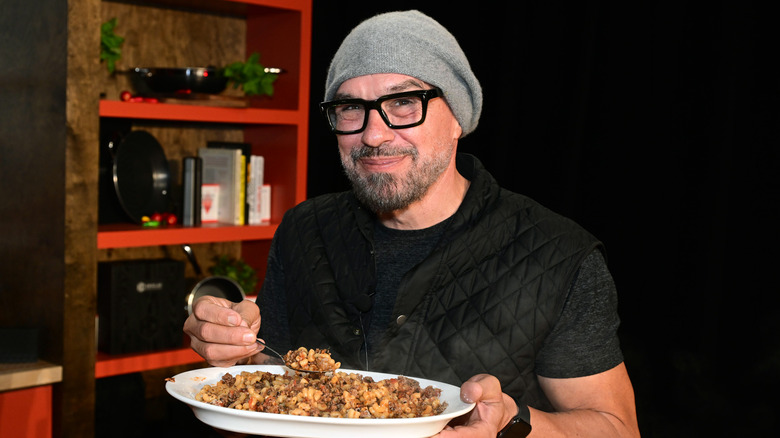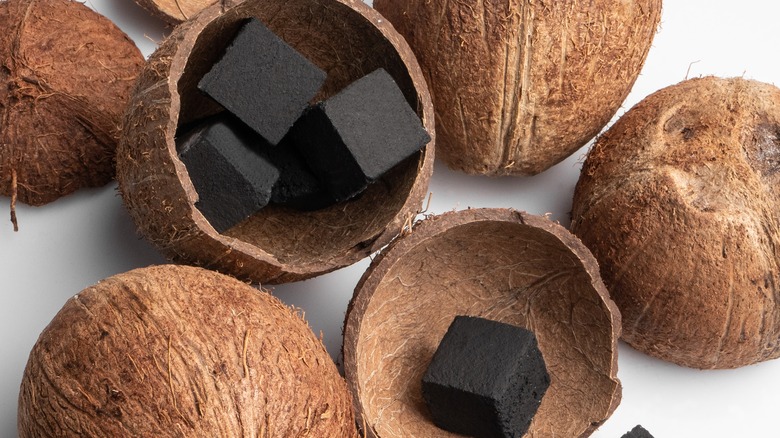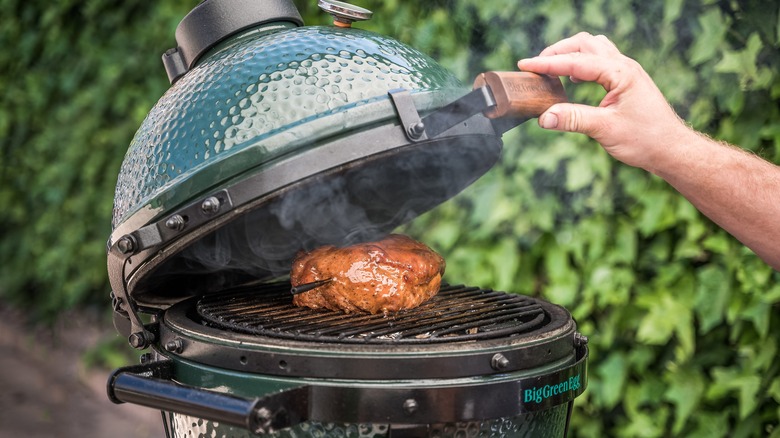The Sustainable Charcoal Alternative Chef Michael Symon Uses When Grilling
Avoiding single-use plastic dishes, shopping locally for groceries, and providing meatless options are already some of the things you might consider when planning a backyard barbecue with sustainability in mind. However, charcoal that is better for the environment may not have occurred to you. A better-for-the-Earth option actually exists — coconut charcoal! It is chef Michael Symon's go-to.
If you are still setting coals on fire and releasing smoke into the atmosphere, you may be wondering how a coconut-based product is any better than the standard stuff. Well, the substantial environmental benefits come from how it is made. Hardwood and coconut charcoal are both made by burning down the material with very limited oxygen, which, via carbonization, transforms it into a porous substance that can burn for a longer time.
Lump charcoal is just straight-up wood that has gone through this process, but briquettes are manufactured using wood byproducts and chemical additives. Either way, that wood has to come from somewhere, and the forests primarily in Africa, South America, and Asia really suffer. Rainforests, in particular, are destroyed to make way for wood plantations, devastating biodiversity and accelerating greenhouse gas production.
On the other hand, coconut charcoal is made from leftover husks after harvests. In tropical areas, there is an abundance of coconut shells that would've otherwise gone to waste. Coconuts are also a resource that renews quickly, and making this charcoal does not require the harsh chemicals that briquettes do.
How to grill with coconut charcoal
You can use coconut charcoal just as you would use lump wood charcoal, but there are some differences in how it behaves. First, they do take a little longer to light and heat up — about 30 minutes or so — while wood charcoal takes about half that amount of time. However, once it is ready to go, coconut charcoal burns hotter, longer, and more consistently than when lighting charcoal briquettes, lump charcoal, or wood. Overwhelmingly, this is a great thing. You don't need to babysit the coals or re-up your grill or smoker as frequently. However, because they do burn at a higher temperature, it may take a little adjusting on the cook's part to avoid accidentally burning the food.
The longer burn time also means that you can use less at once — another plus when it comes to sustainability. Depending on the brand, coconut charcoal is priced comparably to lump charcoal, making the fruity option both better for the environment and more cost-effective. Briquettes are significantly cheaper, but they do have the trade-off of releasing chemical fumes when burned. Chef Michael Symon likes to use coconut charcoal for both smoking and grilling. For a low-and-slow cook, he also adds in a couple pieces of dried hardwood for flavor.
More tips for sustainable grilling and barbecuing
In addition to coconut-based charcoal, bamboo and acacia charcoal are also good alternatives. Bamboo grows very quickly, does not require cutting down forests, and only needs a small amount of water. The resulting charcoal also has a long burn time and does not release a lot of smoke.
Acacia is a type of thorny, scrubby, bushy tree that grows in African grasslands. In Namibia, there is an overgrowth of acacia that is choking out native grasses, making it challenging for small animals to thrive and larger animals to hunt. Harvesting this plant helps the natural environment, and the ability to turn it into charcoal provides an economic incentive to do so.
How you light the charcoal is also something to keep in mind. To decrease the amount of pollutants being released when you grill, skip any kind of petroleum lighter fluids. Opt for natural options instead, or better still, use a charcoal chimney and Alton Brown's hack for lighting your charcoal grill faster. Also, consider the type of grill you are using. If you are in the market for a new one, purchasing a ceramic kamado grill is a great choice. The material and egg shape help with heat retention, so you can use even less charcoal to cook.



